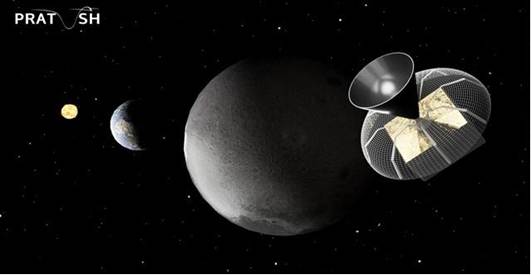A compact single-board computer (SBC), no larger than a credit card, is set to play a crucial role in probing one of the most mysterious epochs in the history of the universe—the Cosmic Dawn, when the first stars and galaxies began to form.
Researchers at the Raman Research Institute (RRI), Bengaluru, an autonomous institute under the Department of Science and Technology, have developed a laboratory model of a digital receiver system for PRATUSH (Probing ReionizATion of the Universe using Signal from Hydrogen), a proposed radiometer mission in lunar orbit.
The system is designed to detect the faint 21-cm radio signal emitted by hydrogen atoms during the Cosmic Dawn. This signal, buried under radio interference millions of times stronger, could provide clues to how the first stars shaped the universe’s evolution.
On Earth, such signals are drowned out by noise from FM transmissions and the ionosphere. The far side of the Moon, considered the most radio-quiet location in the inner solar system, is therefore seen as an ideal site for deploying PRATUSH.
The RRI team has replaced traditional bulky controllers with a lightweight, low-power SBC to coordinate the antenna, receiver, and a field-programmable gate array (FPGA) chip that processes streams of cosmic radio data. The SBC not only records and stores the information but also carries out calibration and preliminary data processing.
“Single-board computers provide an efficient balance of size, performance, and power efficiency to manage the data generated by FPGAs,” said Girish B.S., Research Scientist at RRI’s Electronics Engineering Group.
Performance tests on a reference signal, spanning 352 hours of data collection, have demonstrated the system’s ability to reduce noise to just a few millikelvins, highlighting its sensitivity. Researchers say that with next-generation, space-qualified SBCs and enhanced software, the system could deliver even greater performance in orbit.
By reducing weight and power usage, the innovation makes it more feasible to launch a highly sensitive radiometer into lunar orbit.
“Technologies like this SBC-based receiver will be integral to future payloads seeking to detect the signal of the Cosmic Dawn,” noted Saurabh Singh and Mayuri S. Rao, Associate Professors at RRI.
If successful, PRATUSH could provide unprecedented insights into the birth of the first stars and galaxies, and potentially open windows to new physics — with a small computer at its core, orchestrating one of humanity’s most ambitious efforts to listen to the universe’s earliest whispers.










